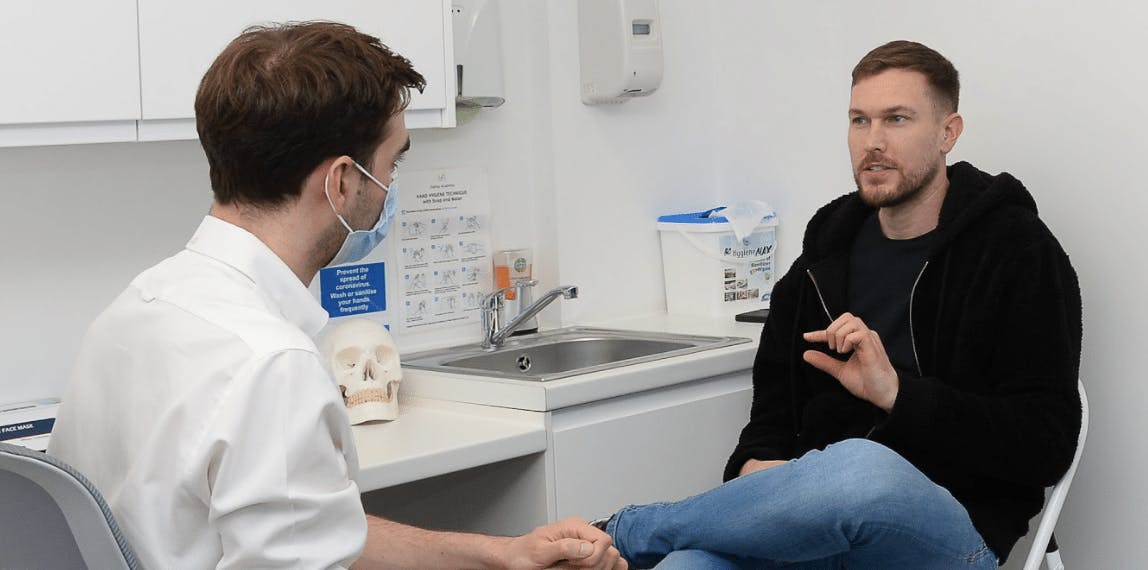Aesthetics Practitioners’ Mental Health Management

Aesthetics practitioners’ mental health management is a crucial aspect of successful practice.
With medical career diversification, injectors are often encountering new and challenging scenarios, clinically or otherwise. For example, in the arena of entrepreneurship and business. This can cause stress and anxiety.
Additionally, hearing others’ negative and, often emotional experiences with their own self-esteem can lead to compassion fatigue.
Importantly, we often spend a lot of time investigating our patients’ concerns and insecurities with their facial appearance. But how do you take care of your own?

Exposure to Body Dysmorphic Disorder
We work in a field where we’re constantly exposed to particular beauty standards and opinions about ageing and appearance. As such, as an aesthetics practitioner, and as a human, you can feel pressured about your own facial appearance.
Body Dysmorphic Disorder (BDD) is relatively common, seen in around 2% of the general population, but is more common in aesthetic patients.
For practitioners, the rate of BDD is unknown. However, theoretically, we’re potentially more exposed as we work in an appearance-related environment. We’re also subject to the associated stigma regarding appearance-related concerns. The implications of such a diagnosis would be profound career-wise too.
The following steps can help you to adopt a healthy, balanced approach to managing your appearance-based mental health whilst working in medical aesthetics...

Appearance-based mental health management
Working in medical aesthetics, you may feel that you’re expected to maintain your own appearance at a certain level. This can include feeling the need to undergo injectable treatments yourself, so patients feel confident in your ability by virtue of how your face looks.
Constant exposure to other people’s own appearance-related issues, as well as wanting to be a ‘walking billboard’ for your practice, can put a lot of pressure on aesthetics practitioners’ mental health.
As such, it’s normal for injectors to develop concerns about their own appearance. These tips can help navigate this...
Set realistic expectations
It’s important to remember that no one is perfect, and everyone has what they perceive to be flaws. Have you considered what you like about your face too? This can open up a more balanced narrative with yourself. It’s also a great technique to use with patients as it facilitates a more positive consultation.
Remember to speak to yourself as kindly as you would a friend or client. Or you can ask a professional colleague to assess your concerns. They can open a more independent, balanced and loving perspective for you.
Also bear in mind that, whilst your patients may expect you to have a neat and professional appearance, they’re unlikely to be as critical of your own facial aesthetics as you think. We should be embracing unique, different looks and flexibly interpreting ideas of what “beauty” is anyway.
There’s certainly no need to have injectable treatments if you don’t want to. Firstly, you wouldn’t be injecting your own treatments as a responsible medical practitioner. Your treatments should be delivered by a trusted colleague who will deliver an independent opinion.
Setting unrealistic expectations for yourself can lead to disappointment and frustration, just like it would for your patients.
If your concerns start to impact you every day, it is well worth talking to someone about it, particularly if you work as a sole practitioner.
Challenge negative thoughts
When negative thoughts about your appearance arise, challenge them with more neutral statements or positive affirmations. Consider what would a loved one say to you? Focus on your strengths and achievements rather than what you consider to be any physical ‘flaws’ with your face.

Tackling compassion fatigue
When your job involves listening to people’s insecurities and dealing with sensitive, emotional subjects, it can take its toll. This can be draining and may lead to emotional exhaustion or disillusion with your work.
Compassion fatigue is prevalent among healthcare professionals, but there are steps you can take to minimise and tackle this...
Develop boundaries to protect your mental health
As an aesthetics practitioner, you should establish clear boundaries between your work and your personal life. You need to be able to disconnect from work and have time to recharge. We do appreciate this can be easier said than done!
Find meaning in your work
Focus on the positive impact you have on patients’ lives and self-confidence. Find balance and meaning by concentrating on the aspects of your work that are most fulfilling and rewarding. Remember why you got into aesthetic medicine in the first place.
Engage in professional development
Continuing your education can help you to stay engaged and motivated as an injector. It can reinvigorate your passion for medical aesthetic practice. You can do this by attending conferences, watching expert videos, networking with fellow professionals and learning new skills. Psychoeducation is also important, for example, understanding concepts of BDD and perception drift.
Additional benefits of this is allowing you to expand your remit and feel more confident and competent in your work.
Discuss your feelings with colleagues
Network with colleagues and keep talking. There’s much to be learned from shared experience and you’ll be better able to appreciate that you’re not alone in your journey. It helps your mental health to discuss challenges as well as successes as you develop.

General mental health advice for aesthetics practitioners
In each of the above instances, and just in general, you can also:
Reflect
We often acknowledge our struggles more strongly than our successes. It’s good to reflect on what has gone well, as well as the challenges you have conquered so far. Small wins accumulate into big progress – you’re allowed to celebrate this!
Seek support
It’s important to have a support system that you can turn to for discussion, encouragement and validation. This can be friends, family, colleagues, or even a mental health professional.
For peer support, having a WhatsApp group or online network, such as Comma, can be a fantastic resource. It certainly can be reassuring to know that you’re not alone with whatever you might be feeling.
Practice self-care
Make time for self-care activities that you enjoy and that help you relax. This can include exercise, meditation, reading, or hobbies. Even just spending time with loved ones or pets, or watching a great TV series can provide welcome relief. Doing nothing for a few hours is also an option! Whatever works for you, make sure you book regular time out to do it.
Take breaks
It’s important to take breaks from work to recharge and reset your mental state. This can include taking time off or scheduling holidays.
Ensuring you take regular breaks is particularly important when first starting out in aesthetic medicine in order to avoid burnout. You’ll most likely be training whilst working in the NHS or private practice, fitting your learning in around other commitments. This can be overwhelming, plus when you’re tired, negativity and self-doubt can creep in.
Keeping on top of your rest schedule is vital for energy, focus and mental clarity.
Your duty of care... to yourself
By implementing these strategies, you can help to protect your mental health and maintain a healthy relationship with your own appearance.
Always remember that it’s not just your patients you have a duty of care to – you’re also responsible for your own well-being and those you care about Your mental health deserves equal consideration with your physical health, for your long term wellbeing.
With thanks to Dr Kalpna Pindolia, facial aesthetics specialist, director of education at Harley Academy and qualified life & mindset coach, for her expert input.
If you’re interested in appearance psychology, please take a look at our article explaining our on-going partnership with the Centre for Appearance Research at the University of the West of England (UWE).
All information correct at the time of publication.
Download our full prospectus
Browse all our injectables, dermal fillers and cosmetic dermatology courses in one document
By submitting this form, you agree to receive marketing about our products, events, promotions and exclusive content. Consent is not a condition of purchase, and no purchase is necessary. Message frequency varies. View our Privacy Policy and Terms & Conditions
Attend our FREE open evening
If you're not sure which course is right for you, let us help
Join us online or in-person at our free open evening to learn more
Our Partners













STAY INFORMED
Sign up to receive industry news, careers advice, special offers and information on Harley Academy courses and services

